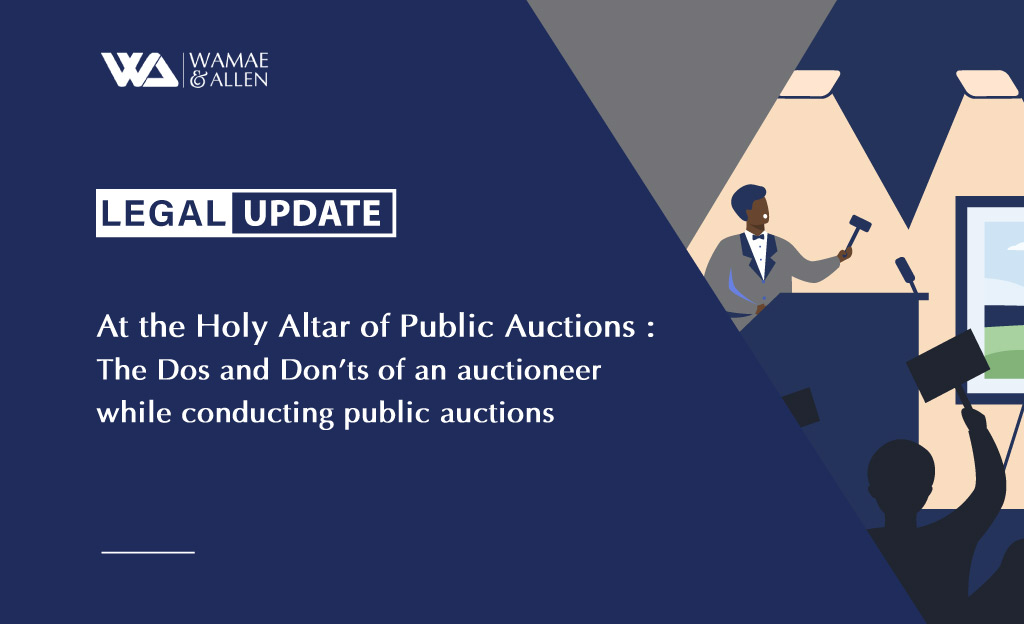- Similarly, in Stephen Mwallyo Mbondo v County Government of Kilifi [2021] eKLR B.O.M Manani had this to say;
“Further, I understand auctioneers to be officers of the court. They are actually appointed by the court to execute its orders. To this extent, they are agents of the court. It therefore appears to have been inaccurate for the trial court to have observed that the Appellant’s advocates appointed the auctioneers to execute the warrants in question. This position is made clear in National Bank of Kenya Ltd v Joly Family Stores & another [2005] eKLR, when the court said as follows: –
‘’Contrary to the finding of the trial Court, auctioneers, while executing decrees of the courts, are indeed agents of the Court. It is the courts which give them authority to execute, for example by the different modes of warrants and the same court can order them to stop an execution process.’’
- Therefore, an auctioneer’s first duty is to the court and thereafter to the instructing client or agent. He must execute his duties strictly within the law and rules of the auction. He cannot purport to manufacture his rules otherwise the long arm of the law will catch up with him within a blink of an eye and punitively punish him.
- DUTY TO ADHERE TO THE AUCTION RULES WHEN REPOSSESSING, ATTACHING, STORING OR SELLING ANY PROPERTY PURSUANT TO ANY WRITTEN LAW OR CONTRACT
- DUTY TO MAINTAIN RECORDS AND BOOKS OF ACCOUNT AND FURNISH THE SAME WITH THE AUCTIONEERS LICENSING BOARD
- DUTY TO ENSURE HE/SHE HAS A VALID VALUATION REPORT
- DUTY TO ISSUE A REDEMPTION NOTICE
- DUTY TO ADVERTISE THE PROPERTY FOR SALE
- the date, time and place of the proposed sale;
- the conditions of sale or where they may be obtained and the time for viewing the property to be sold in addition to any other matter required by the court.
- AUCTIONEER NOT OBLIGATED TO RE-ISSUE THE REDEMPTION NOTICE IF AN AUCTION ABORTS OR IS POSTPONED
- AUCTION OUGHT TO BE AN UNINTERRUPTED TRANSACTION
CONSEQUENCES ON FAILURE TO ADHERE TO THE LAW
- It should be noted that if the Auctioneer fails to comply with the rules appurtenant to an auction, the licence of such an auctioneer may be suspended or revoked pursuant to the provisions of Section 28 of the Auctioneers Act which provides that; Court may order revocation or suspension of licence
(1) court in imposing a penalty on a licensed auctioneer for an offence under this Act or under any other written law may, if in the opinion of the court, the offence is of such nature as to warrant the suspension or revocation of the auctioneer’s licence, order the suspension or revocation of the licence
(2) The court shall forthwith notify the Board of every order under subsection
- Additionally, a complaint may be lodged before the Auctioneers’ Licensing Board as stipulated under Section 24 of the Act and hereinbelow are the punishments that can be meted out to an auctioneer if found guilty of misconduct;
- The auctioneer can be admonished,
- His licence can be suspended for a period not exceeding six (6) months,
- His licence can be revoked
- Such condition or conditions as the Board deems appropriate can be attached to the auctioneer’s licence.
- He can be ordered to pay a fine not exceeding Kshs.100,000/=
- He can be ordered to pay compensation not exceeding Kshs.100,000/= to the person demnified by the auctioneer’s misconduct,
- That he can be disqualified from holding a licence for such period as the Board thinks fit and
- Such combination of the above orders as the Board thinks fit.
E. CONCLUSION
- From the foregoing discussion, we have observed that public auctions ought to be conducted with utmost diligence and adherence to the law and rules appurtenant thereon. The process should not deny the chargee its right to realize security nor should it clog the chargee’s right of equity of redemption.
- Indeed, an auction is a sacred event that should be undertaken with utmost integrity. An auction process is a spring flowing from one event to another as laid down in the Auctioneers Act and the Rules. Any attempt to digress from the set guidelines as has been pronounced by court is illegal, unprocedural and fatally defective.
This article is provided free of charge for information purposes only; it does not constitute legal advice and should be relied on as such. No responsibility for the accuracy and/or correctness of the information and commentary as set in the article should be held without seeking specific legal advice on the subject matter. If you have any query regarding the same, please do not hesitate to contact Litigation vide litigation@wamaeallen.com


